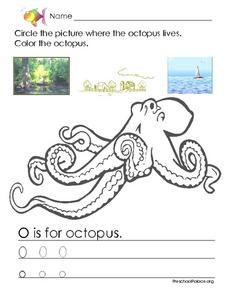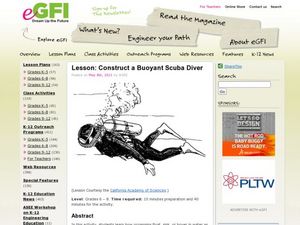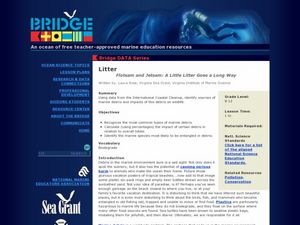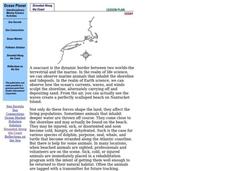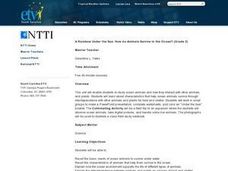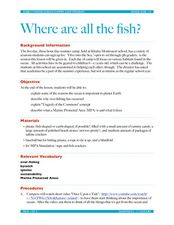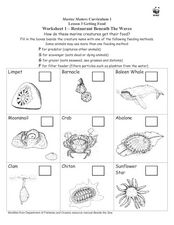NOAA
Technology I
Isn't technology great? The 12th installment of a 23-part NOAA Enrichment in Marine sciences and Oceanography (NEMO) program introduces technology that marine scientists use. Pupils take part in an activity using conductivity,...
Curated OER
Word Search: Common Seashore Plants
I really like these colorful word searches put out by The Waterford Press. Learners view 18 beautiful and accurate drawings of common seashore plants, and then must find them in a word search. An answer key is provided.
Curated OER
Word Search: Common Seashells
Here is a wordsearch on common seashells. There are 25 shell words that have to be found in the search. Each one has a colorful and accurate picture on the worksheet. An answer key is included.
Curated OER
Who Am I?
Here is a colorful worksheet that has learners look at a variety of salt water fish, then choose the name that identifies each one. The names of the fish are at the bottom of the worksheet. The pictures are colorful and accurate...
Curated OER
Who Am I?
Youngsters find these common sea plants and animals using a worksheet. Each of the plants and animals has a colorful representation on the worksheet. There is an answer key at the bottom of the worksheet that has all of plant and animals...
Curated OER
Ocean Commotion Activity - Dioramas
Groups make a model of an Ocean Commotion exhibit based on what they saw during the fieldtrip. These dioramas can be used as an informal assessment of student knowledge acquired at Ocean Commotion.
Curated OER
Number Search in Monterey Bay Aquarium
Youngsters search for an animal with body parts for each number from one to ten during a field trip to an aquarium. They count rays, fins, feet, gills, eyes, spots or anything. When they get back to the classroom, they compile their...
Curated OER
Aquatic Roots
Young scientist use reference materials to research various local aquatic plants and or animals to find out whether they are natives or exotics. They investigate their impacts on people, other animals and the environment. Students...
Curated OER
Where the Octopus Lives
In this letter O worksheet, students color a large picture of an octopus. Students analyze two pictures of habitats and circle the one that shows where an octopus would live. Students trace and practice upper and lower case letter Oo.
Curated OER
Construct a Buoyant Scuba Diver
Groups of young oceanographers get to use action figures to experiment with the property of buoyancy! This memorable lesson plan provides detailed background information, a link to the laboratory worksheet, and thorough instruction...
SeaWorld
Design a Fish
Craft some neat refrigerator magnets while studying ocean animals with a lesson about the anatomy of a fish. After kids learn about the different parts and shapes of fish, they use modeling compound to design their own fish.
NOAA
Why Should I Care?: Show How Increased Carbon Dioxide Makes the Ocean More Acidic
How does a change in pH affect the ocean ecosystem? Scholars explore the idea by making an acid-base indicator in part seven of the 10-installment Discover Your Changing World series. First, they explore impacts of carbon dioxide in...
Curated OER
Career Exploration
Students create a pamphlet, brochure, handout, or poster about a career in the marine sciences. For this marine science lesson, students use the Internet to research a marine science career. They create a printed media item to share with...
Curated OER
Impacts to the Open Ocean
Learners investigate how human beings impact ocean ecosystems. In this ocean ecosystem lesson, students explore how marine debris affects marine life. Internet resources are provided.
Curated OER
All About Me-I'm My Own Research Project
Third graders see how to do a research project. They understnad how to categorize information about themselves and relate it to information on sea animals for a future research project. This lesson fits in nicely with any unit on animals.
Curated OER
The Science Behind Dolphins
Students discover facts about marine mammals, specifically dolphins. In this K-2 lesson plan, students identify the different species of Cetaceans, focusing on dolphins. Students answer true/false questions regarding cetaceans and...
Curated OER
LitterFlotsam and Jetsam: A Little Litter Goes a Long Way
Students explore the concept of environmental stewardship. In this science instructional activity, students investigate data from the International Coastal Cleanup, identify sources of marine debris, and discover the impacts of this...
Curated OER
Biodiversity
Students explore the diversity of different marine sanctuaries. For this biodiversity lesson students work in groups to explore a sanctuary.
Curated OER
Stranded Along The Coast
Learners reflect and investigate how a seacoast is the dynamic border between two worlds-the terrestrial and the marine. In the realm of life science, we can observe marine animals that inhabit the shoreline and tidepools. In the realm...
Curated OER
Predator/Prey Activity: Fish Feeding, Environments, and General Behavior
Pupils explore concepts of environment and survival among different marine life, focusing on the ocean environment.
Curated OER
Sea Connections
Students, after locating different marine habitats on a globe, play a card game about ecosystems, food webs and organisms.
Curated OER
A Rainbow Under the Sea: How do Animals Survive in the Ocean?
Second graders read books, watch videos, complete worksheets and participate in class discussions about ocean animals. They, in groups, design PowerPoint presentations on selected marine animals.
Curated OER
Where Are All the Fish?
Young scholars identify the problems that marine life is facing today. In this marine science lesson, students explain how Marine Protected Areas can help the ocean and the fish. They brainstorm ways to help in the conservation effort.
Curated OER
Restaurant Beneath the Waves
In this marine life worksheet, learners fill in the boxes beside each ocean creature name with one of the following feeding methods: predator, scavenger, grazer, and filter feeder. Students then list or draw marine creatures that use the...










